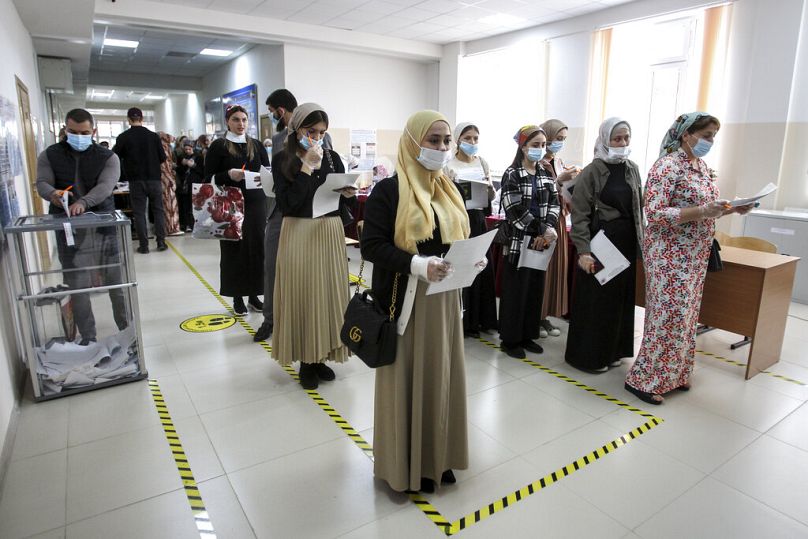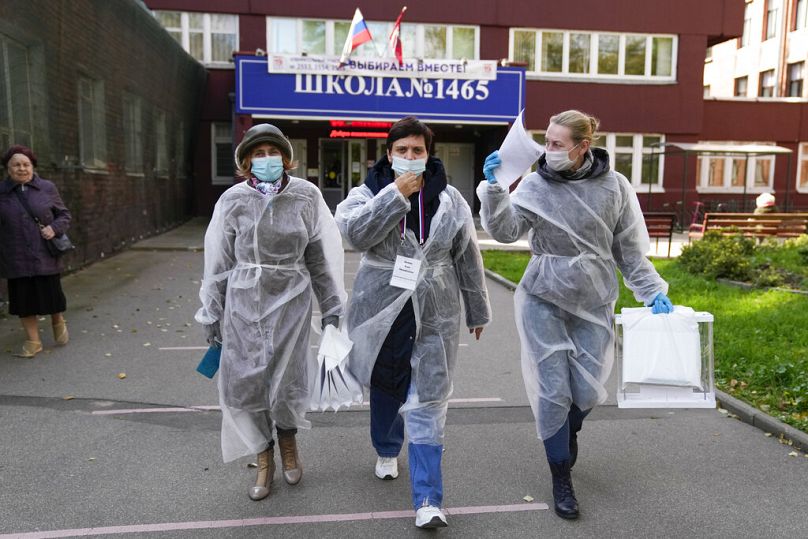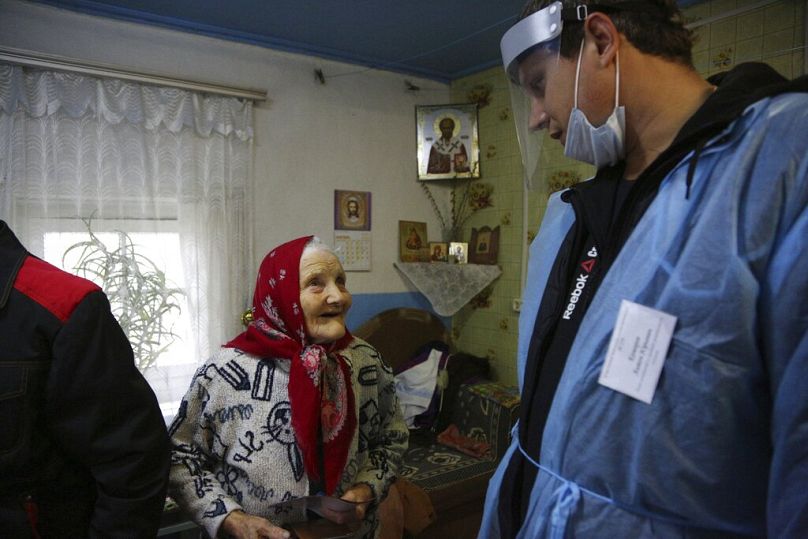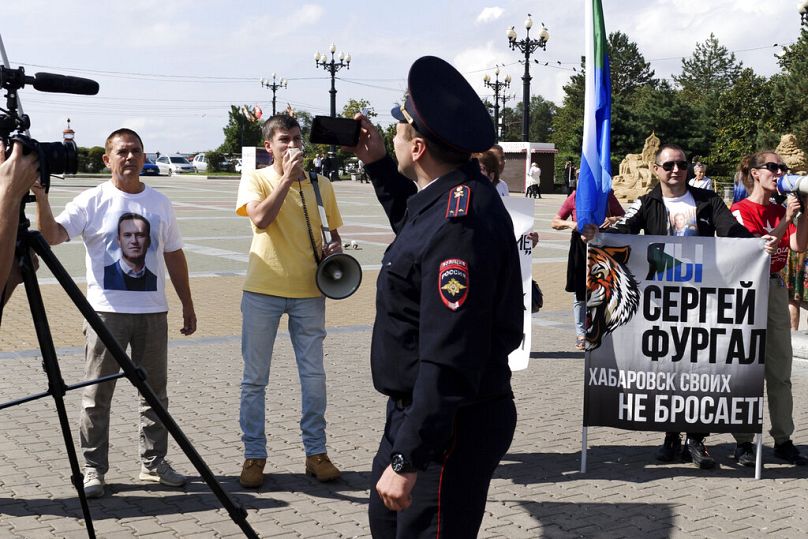The voting was marred by numerous reports of violations, including ballot-stuffing.
Vladimir Putin's party is on course to retain a significant majority in Russia's parliament, following last weekend's general election.
 ADVERTISEMENT
ADVERTISEMENT
 ADVERTISEMENT
ADVERTISEMENT
Projections covering 30% of the polling stations showed his United Russia party in the lead with 45% of the vote for the 225 deputies apportioned by party lists.
Another 225 lawmakers are being chosen in individual races, where early results showed United Russia's candidates leading in 179 of those single-constituency seats.
The election is widely seen as an important part of Russian President Vladimir Putin’s efforts to cement his grip on power ahead of the 2024 presidential election, in which control of parliament will be key.
Andreï Turtchak, one of the party leaders, celebrated the electoral result with a group of supporters: "I congratulate you all on this clean and honest victory", he said late on Sunday.
However, if the result was to be confirmed, United Russia would suffer an 8% drop compared to the previous general election, in 2016.
The KRPF communists are set to finish second, with about 21% of the vote.
Some 14 parties have fielded candidates for half of the 450 State Duma seats.
Each of them needs at least 5% of the vote to win at least a seat.
Turnout at 6pm local time on Sunday - three hours before polls closed - was 45%.
Alleged violations cast a shadow over counting
The election lacked significant opposition presence after Russian authorities declared organisations linked to jailed Kremlin critic Alexei Navalny to be extremist.
The voting was also marred by numerous reports of malpratice and violations, including ballot-stuffing, which could cast doubt on the results in some quarters.
Gennady Zyuganov, the head of the Community Party, had called on Saturday for police and the national electoral commission to look into "a number of absolutely egregious facts" including alleged ballot-stuffing in some regions.
Zyuganov said his party has tallied at least 44 incidents of voting violations and had applied for permits to hold protests next week after the voting ends on Sunday.
On Saturday, the news website Znak said a resident of the Moscow region had been offering 1,000 rubles (almost €12) to people who voted for United Russia.
The publication said it called the man, who said the payment would come if the caller provided evidence of their vote through a messaging app.
Last Thursday, the European Parliament passed a resolution recommending that, should the election be considered fraudulent, the EU should not recognise the Russian State Duma.
For German MEP Sergey Lagodinsky, co-author of the Parliament's report on relations with Moscow, there are differences between the Russian people and Vladimir Putin's regime.
**"We are not enemies of Russia. This Parliament and the Europeans are on the side of the Russian people and of Russian civil society, which is under pressure. We are critical, though, and more than critical, about the situation with democracy and about this government. The situation will force us to be more geostrategic in how we deal with it," **Lagodinsky told Euronews.
On Monday too, the European spokesperson for foreign affairs also raised concerns over the election result.
"What we have seen in the run-up to these elections is an atmosphere of intimidation against all independent critical voices," said Peter Stano told reporters during a press briefing.
"There has been no independent international observation, so it's very difficult to see how the elections really went," he added.
"But we have a number of indications from independent local observers that there were many irregularities during these elections."
The Organization for Security and Cooperation in Europe did not send observers this year, citing excessive restrictions by Russia.
But Golos, an independent election-monitoring group, has also reported sealed envelopes for storing ballot tallies being closed and reopened, and lax measures for guarding ballots at polling station, with one set of papers apparently stored overnight in a cabinet with a broken door.
Media outlets in St. Petersburg also reported on suspected cases of “carousel voting,” in which voters cast ballots at several different polling stations.
Elsewhere one of the leaders of the Yabloko party in St. Petersburg, Boris Lazarevich Vishnevsky, discovered in the run-up to the vote that two other candidates - including one from United Russia - had registered under his own name for the concurrent City Council elections.
The two competitors appeared to have changed their names weeks before the election, the 65-year-old said. He added: "Of course, it aims only to confuse people, so that they will make a mistake... Apparently they consider me a strong rival."
Votes cast amid apathy and discontent on the streets
The polls opened on Friday with unexpectedly long lines at some polling stations. Independent media suggested this could show that state institutions and companies were making their employees vote.
People in Moscow had few little for political change on Saturday as Russia entered the second day of voting.
"I don't believe these elections will change anything," said Olga Pritula, a market stallholder. "Nothing changes here. Everything remains the same."
Teacher Elvira Ere said she believed politicians weren't interested in making ordinary people's lives better: "They sell oil, gas and waste, but the lives of ordinary people don't change."
The vote comes after mass protests engulfed Russia earlier this year in response to a state crackdown on opposition groups, including jailed Kremlin critic Alexei Navalny.
Navalny's Smart Voting initiative, which advises Russians on how best to cast their vote in order to keep United Russia from winning in their constituency, was taken offline by authorities shortly before the election.
In Khabarovsk in Russia's Far East, a handful of demonstrators also still gather each night to protest the detention of the region's popular Liberal Democrat governor, Sergei Furgal, who was arrested last year on charges of being involved in killings in 2004 and 2005.
Furgal's Kremlin-appointed replacement, Mikhail Degtyaryov, is on the ballot for the regional election. “Whoever posed even the smallest threat was barred from running, and they left only spoiler candidates,” said 64-year-old protester Zigmund Khudyakov.
Denis Pedish, a 47-year-old education worker who comes to protests with a packed bag of essentials in case he is detained, told AP: “We constantly live in fear. It's difficult.
“But people have hope and faith, and are actively fighting the lawlessness of the authorities and the lawlessness of the elections, which are a laughing stock for the world to see.".
The polls opened yesterday with unexpectedly long lines at some polling stations. Independent media suggested this could show that state institutions and companies were forcing employees to vote.
The election is widely seen as an important part of President Vladimir Putin’s efforts to cement his grip on power ahead of the 2024 presidential polls, in which control of the State Duma, or parliament, will be key.
Although polls indicate that general approval for the Kremlin-backed United Russia party is low, the party is expected to ride to an overwhelming first place in the new parliament.
Putin strives to consolidate power before 2024
The United Russia party, which is loyal to Vladimir Putin, will almost definitely retain its hold on the State Duma despite polls indicating general approval is low.
But some pollsters believe it could lose its current two-thirds majority, which is needed to change the constitution.
The Communists generally support Kremlin initiatives in the parliament, but their gaining seats would be a loss of face for United Russia.
This election is important for Putin as the new lawmakers will still be in post in 2024, when his term officially expires. It's not yet clear whether he will stand for election again or seek another means to try to stay in power.
The 68-year-old premier still enjoys firm support from many in Russia. Antonina Starikova, 88, a resident of the Siberian village of Desyatovo, said she was voting for United Russia party "so that everyone is united, so that there's no anger."
Dozens of people have also travelled from the separatist-controlled Donetsk in Crimea, which Russia annexed from Ukraine in 2014, to cast their vote in the country.














